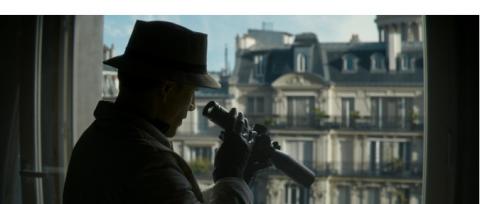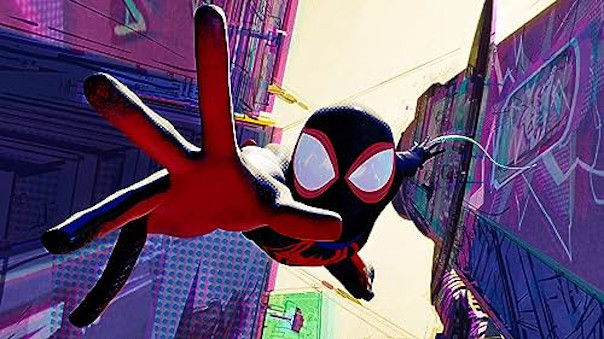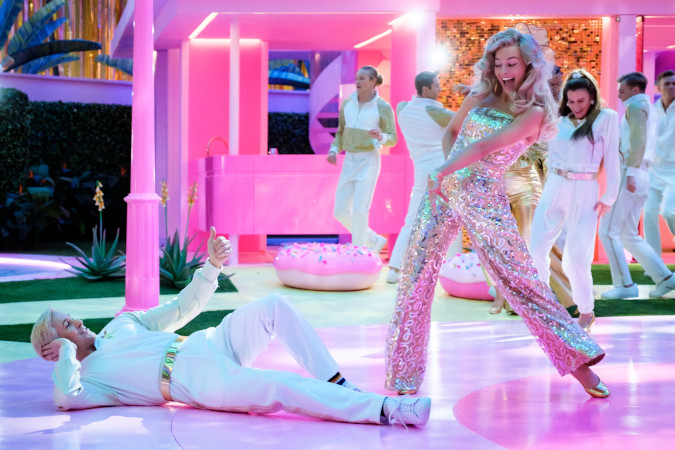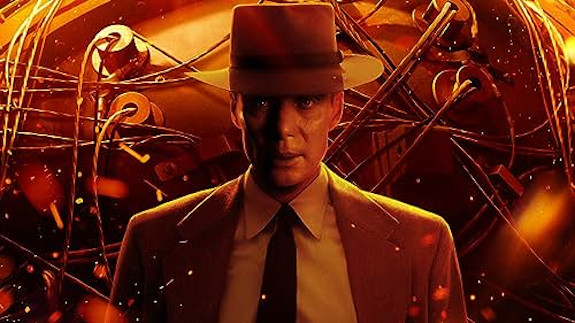The Best Films of 2023

For a film critic, creating a year-end list of best pictures can be a torture test. Because many of the finest films are released – in a flurry – during the last two months, one is constantly cramming “just one more” viewing into an already busy schedule. But it’s easy to fall into the year-end trap that studio marketers have created by design. By releasing so much quality content during “awards season,” films that came earlier have a tendency to get squeezed from memory. That means any critic worth their time must painstakingly account for all the pictures they’ve seen, doing their best to decide if that little gem from March was really better than the holiday spectacle from last night.
It’s an imperfect science, and I periodically look back and lament missing a film. Still, there is value in this exercise. Even should I later decide that No. 10 should have been No. 6 or that I unfairly dropped a deserving film on the third edit, I am comfortable saying that each of these movies is one that film lovers should watch. Some on this list are culturally important. Some have themes we should all be contemplating. Some are just pure, joyful entertainment. And – as of this moment in December 2023 – they are my top 10.
10) The Killer
Prior to 2023, Michael Fassbender had been missing from the cinema circuit for too long, in part because he was nurturing a second career as a racecar driver. In fact, Fassbender appeared in only one movie (Dark Phoenix) between 2023 and a very busy 2017. That made it a treat to see him in both Next Goal Wins, where he plays an arrogant, top-level soccer coach assigned an infamously bad team, and director David Fincher’s The Killer.
Of those two 2023 movies, it’s the latter that is now a crucial part of his acting catalogue. Fassbender plays a steel-nerved assassin who meticulously plans his hits, leaving zero room for error. Alas, he does falter, putting himself at odds with the dangerous people he works for. Fincher is a master storyteller and his pairing with Fassbender is a dream. The director allows much character development to play out through Fassbender’s constant, stoic narration, but key plot points are also advanced in sudden, sometimes-shocking bouts of violence, each appropriate to the subject matter. Add a short-but-incredible supporting performance by the great Tilda Swinton, and you have a remarkable thriller.

9) Wonka
For me, Willy Wonka & the Chocolate Factory was not a childhood favorite. I remember liking it, but I haven’t returned out of sentiment, time and again, like I have with, say, Star Wars. Credit writer-director Paul King and his crew for reigniting my interest in the title character and the original, 1971 movie. Wonka is a prequel of sorts, looking back at a struggling Willy (Timothée Chalamet) who travels to the big city with dreams of starting a chocolate empire. Alas, resistance from a devious “chocolate cartel” and skullduggery by a nasty innkeeper (Olivia Colman) and her assistant (Tom Davis) quickly land Willy in indentured servitude. As bleak as that may sound, Wonka is an upbeat affair, with most action centering on Willy’s clever nature, as he works with other servants in an effort to escape their plight and keep his dreams alive. The fantastic cast also includes Calah Lane, Hugh Grant, Keegan-Michael Key, Sally Hawkins, and Rowan Atkinson. All are wonderful, but Chalamet steals the show, especially during some of the beautifully rendered musical numbers. Wonka is a sweet treat for children and adults alike.
8) Saltburn
Some consider this film a black comedy, but I believe it is better described as a psychosexual thriller. The plot centers on Oliver Quick (Barry Keoghan), a sharp-but-awkward scholarship student at Oxford University. At first a social castaway, Oliver’s status changes when a charming and wealthy peer, Felix Catton (Jacob Elordi), takes him under his wing. As the school term ends, Felix invites Oliver to spend the summer at his parents’ massive, historic estate named Saltburn. The result is life-changing.
Saltburn invites viewers to consider everything from the powerful nature of greed, love and lust to the inherent stigma of class divides. This description is vague by design because Saltburn – written and directed by Oscar winner Emerald Fennell – is easily spoiled if one knows too much going in. Occasionally Fennel takes things too far, incorporating sequences more geared toward shock value than advancement of the narrative. But that’s a minor complaint in a project that is ultimately so powerful. This movie leaves a mark.

There are movies that quietly steal your heart. Such was the way writer-director John Carney’s Flora and Son hit me. The film, about a single Irish mother (Eve Hewson) who tries to bond with her delinquent son (Orén Kinlan) by studying with an American online guitar teacher (Joseph Gordon-Levitt) is, at turns, sentimental, painful, forlorn and sweet. It is also littered with great musical performances and a handful of exquisite, original compositions. This is the only film this year that immediately prompted me to download the soundtrack and listen on repeat. If that doesn’t qualify a picture for the top-10, I don’t know what could.
Much has been made of the fact that The Holdovers is director Alexander Payne’s best film since Sideways with Paul Giamatti. As beloved as that earlier, wine-country comedy was, I assert that The Holdovers is better. The movie – about an aloof boarding school teacher forced to babysit students with nowhere to go during the holidays – is understated and melancholy, but in the best possible way. Giamatti makes the instructor, Paul Hunham, come alive with the type of performance that too rarely makes it to screen.
Although the picture is just shy of 135 minutes, I understood Hunham by the time credits rolled. This type of character development is often reserved for miniseries and TV programs that allow hours for character development, but Payne and Giamatti make the most of the time they have. Most notably joining Hunham at school for the holiday break is facility cook, Mary Lamb (Da’Vine Joy Randolph), and student Angus Tully (Dominic Sessa). Separated from the usual trappings of Christmas, these three form a makeshift family, and all are reminded that – despite the close relationships shared by students, teachers and school staff – it’s rare for these people to truly know one another. Due to the timing and subject matter, The Holdovers is a holiday film, but it will remain relevant year-round. Just don’t watch when you need a pick-me-up. The Holdovers acknowledges that bad things happen to good people and considers the consequences of paths not taken and dreams left unfulfilled. It’s not fair to call it sad, but it is contemplative, deep and affecting.

5) Spider-Man: Across the Spider-Verse
Does an animated superhero film really deserve to rub shoulders with the biting comedies and hard-hitting live-action dramas that typically occupy year-end best-of lists? You bet. Across the Spider-Verse is not only a rare sequel that bests the original, it’s an ambitious movie where directors Bob Persichetti, Peter Ramsey, and Rodney Rothman pull out every tool in their kits to tell a fantastic story.
Because the movie envisions a multiverse where many Spider heroes exist, the directors change animation styles depending on what character is being featured and what plot point is being illuminated. One could spend hours analyzing the visual storytelling alone, but most viewers will probably be so swept away by the fast-paced plotting that the nuance will hang in the background.
The key characters are Miles Morales (voiced by Shameik Moore), Peter B. Parker (Jake Johnson) and Gwen Stacey (Hailee Steinfeld), each a Spider hero. These three – and others – must join forces to stop a threat to all their realities. The one down side? This film is part of a trilogy that started with Into the Spider-Verse, and the final leg was delayed by the Hollywood strikes. That means the conclusion – originally slated for March 2024 – is probably further out than most would like.
4) American Fiction
Often, thought-provoking comedies are so dry that they actually feel like dramas. American Fiction is a pleasant surprise that refuses to bury its humor in morosity. This approach is as refreshing as it is laugh-out-loud funny. Jeffrey Wright kills as Thelonious “Monk” Ellison, a novelist and academic who refuses to dumb down his work, despite the fact that he toils in relative obscurity. Although Monk is a black man, he is upset when a publisher passes on his latest work – a piece that has nothing to do with race – because it doesn’t properly depict black America.
In frustration, he writes a typical, “black” novel and demands that his agent send it out as a joke. You don’t have to imagine his surprise when a publisher instantly pounces because writer-director Cord Jefferson and his co-screenwriter Percival Everett do the imagining for you. American Fiction forces viewers to think deeply about race, art, fame, art criticism and American culture in general. These are important topics, and any discussion could easily become uncomfortable but, as with all good humor, American Fiction delivers its messages with a feather rather than a hammer.

3) Barbie
If you think the summer hype over Barbenheimer was overblown, I urge you to reconsider. In July, all we knew was that Barbie and Oppenheimer were rolling into theaters with big budgets ($145 million and $100 million respectively), noteworthy directors and big-name casts. Five months later, we know both films have stood solid against the onslaught of fall and winter awards contenders.
Barbie isn’t a perfect film, but it is a complete cinematic experience. Greta Gerwig and husband/screenwriter Noah Baumbach started by crafting a script that is infinitely more thoughtful than any previous Barbie project. Then, as director, Gerwig assured it would succeed by merging a perfect cast (Margot Robbie as the primary Barbie and Ryan Gosling as a perfectly rendered beach Ken), with incredible art direction, a wry sense of humor and an approach that could appeal to those who both love and hate the doll franchise. Barbie wasn’t an easy movie to make, but it is easy to love.
2) Air
In an age of rampant commercialization marked by increasingly obvious product placement, it’s tough to recommend a movie that is – in many respects – an advertisement. But, let’s face it, Air tells a damned good story. There will be – dependent on age – viewers who don’t remember the time before Nike’s swoosh entered our mass culture. It’s important to note that this was once the case because Air is – at its core – an underdog tale. Nike wasn’t always huge and Michael Jordan wasn’t always destined to hawk the company’s shoes. That partnership came thanks to a passionate courtship launched by sports marketer Sonny Vaccaro (Matt Damon) and Nike CEO Phil Knight (Ben Affleck).
Yes, the film is a big love letter to Nike, but it’s also dramatically stirring and wonderfully entertaining. As an aside, it’s worth noting that Ben Affleck has now cemented his place in the upper echelon of Hollywood directors. He may have broken through as a writer who just happened to be a hunky leading man, but the guy who also handled behind-the-scenes work on Gone Baby Gone, The Town, Argo, and now Air has nothing to prove.

1) Oppenheimer
Christopher Nolan can do moving, understated thrillers (Insomnia), crowd-pleasing blockbusters (The Dark Knight), and mind-bending special-effects extravaganzas (Inception). He can also bridge the gaps, as he has with Oppenheimer.
Nolan’s meditation on the father of the atomic bomb is tense, dramatic, and beautifully crafted from the first frame to the last. Much credit goes to Cillian Murphy, whose interpretation of the title character is worthy of an Oscar, and Robert Downey Jr., whose reading of Lewis Strauss reminds us that he is so much more than Iron Man.
But this film is too good to give the cast all the credit. As always, Nolan sets his tone quickly, then builds to a climax that is every bit as tense and exciting as those in Downey’s superhero films. When Nolan made his other historical epic – Dunkirk – he relied on subtlety. Here, his approach is more straightforward and, I daresay, the results are even more effective. Oppenheimer is as brilliant as the scientist himself -- and much less controversial.
Author Bio:
Forrest Hartman is Highbrow Magazine’s chief film critic.
For Highbrow Magazine































































































































































































































































































































